
The document of day: the Origins of American behavior against Russia
Russia the US is not their lobbyists, who could convey her point of view to the American establishment. While Washington and Moscow have fundamentally different perceptions of the outcome of the cold war and disagree on what should be the world order. As a result a large part of the American elite considers Russia a dying state and therefore sees no reason to improve a relationship with her, preferring to wait for its final weakening. About it in article “to Harrass and sit” write the professors of the faculty of world economy and world politics, National research University “Higher school of Economics” Yuval Weber and Andrei Krickovic. Full version of this article was published in the journal “Russia in global politics”, “Tape.ru” offers its readers a condensed version.
In the core of the conflict between Moscow and Washington are fundamental differences regarding the Genesis of the current world order. From the point of view of Russia, its origins go back to 1989, when Mikhail Gorbachev made an effort to put an end to the cold war. Gorbachev sought to revitalize the Soviet economy and to keep the system by reducing the huge defence spending and moving from autarky to involvement in the world economy. He boldly refused political and military dominance of Russia in Eastern Europe, assuming that an internal restructuring will give forces of the USSR, which will continue to play a key role in world politics, as a full partner, not an enemy of the United States.
From the American point of view, the current world order emerged after the collapse of the USSR in 1991. the New system, in which Russia does not have any residual privileges, and States are free to choose alliances and associations, has replaced bipolarity. The sole dominance of the USA allowed the members of the Warsaw Pact to join NATO. Thus, the obvious is a basic difference in that, when it was installed the status-quo. If in 1989-m, then the US now — hegemonic-revisionist. But if in 1991, is a revisionist Russia.
This fundamental discrepancy is due to the policy of the parties in Ukraine and Syria. Russia believes that it only responds to threats to its security and national interests, which carries a short-sighted American foreign policy. So, Ukraine Moscow protects vital sphere of influence from invasion of the West. In Syria prevents further destructive “regime change” and opposing the real terrorist threat from the “Islamic state” (IG, is prohibited in Russia), protecting the legitimate Syrian government. In Washington, Moscow’s behavior is perceived differently. According to the United States, Russian policy leads to destabilization. Moscow’s actions in Ukraine (especially the Crimea annexation) are considered as a serious challenge to the international order and one of the immutable rules — the inadmissibility of unilateral change of borders. Similarly, Russia’s support of Bashar al-Assad is perceived as an obstacle in the fight against ISIS and a factor aggravating the refugee crisis.
As a result, many in the White house consider Putin’s Russia a revisionist power, challenging the global dominance of the United States. In Washington still heard voices calling to negotiate with Moscow to avoid a new cold war. But structural, political and ideological factors doom any agreement to failure. The debate in U.S. political circles focused on how to correct the behavior of Russia or, failing that, how to isolate and contain non-democratic regime.
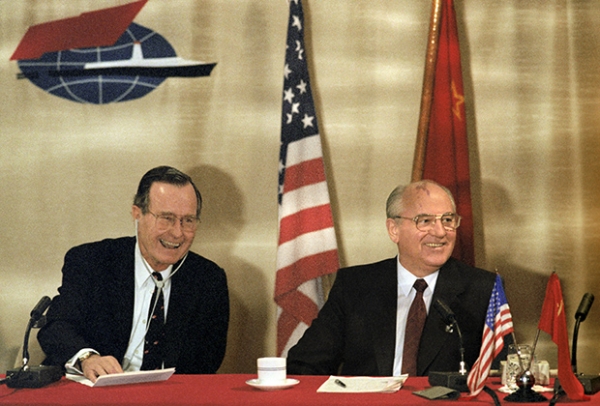
U.S. President George Bush senior and Secretary General of the CPSU Central Committee, Chairman of the Supreme Soviet of the USSR Mikhail Gorbachev at joint press conference. December 3, 1989
Photo: Yuri Somov / RIA Novosti
Structural factors
Relations between States are largely determined by such structural factors as the balance of power and capabilities. After the cold war American observers perceive Russia as a fading power, is losing global and regional superiority due to their inability to adapt to a new a globalized world, where economic and technological benefits is more important than military power. Accordingly, President Obama scornfully took Russia to a “regional powers” and questioned its ability to affect the international situation, Senator McCain called Russia “a gas station, trying to impersonate the country.”
Unipolar international structure, installed in 1991, and the weakening of Russia within its framework allowed us to ignore the objections against actions that threaten, in the opinion of Moscow, its key interests (placement of ballistic missiles in Central Europe and NATO enlargement). To be taken seriously and given a seat at the negotiating table, earned in 1989, Russia must demonstrate that the disregard of its interests is costly. Therefore, you should aggravate the conflict and balance at the margin to show: ignoring Russia in international security and order would harm America and her allies.
Thanks to this strategy, the country may be in the limelight, but it is unlikely to help if the ultimate goal is to achieve recognition as a compliant partner. Escalation and destabilization of the situation in Ukraine, in Syria and other places are able to draw attention to the concerns of Moscow and to make her position more important in certain issues. But at the same time it will make the Kremlin less reliable partner in future negotiations. Not only President Obama, but any other American leader would not want to reward Russia for “bad behavior” because it will provoke further aggression, and other countries (China, that is especially dangerous) will begin to test the resolve of the United States.
Political scientist Robert Gilpin has long said that the real currency in international relations serve as prestige and status (not power, as claimed by neo-realists). If the status and prestige of the country is recognized by others, it can achieve its goals without resorting to brute force. Washington does not want to open a discussion on the issues of the world order, because this will give Russia greater status and prestige than it deserves given its current capabilities. The US perceive Russia as serialmouse power, so I prefer to postpone any confrontation in the distant future when it becomes even weaker.
Domestic policy
If structural factors prevent the United States to recognize Russia’s concerns and to work out a compromise, avoid confrontation, due to internal political factors both Democrats and Republicans take a hawkish position, but to a different degree, support the intervention meaningful to the Moscow sphere. Presidential cycle gave candidates from both parties to show “rigidity” in matters of security. Republicans use Russia and its aggressive behavior to attack Obama. Their candidates claim that the President was too soft on Russia. They criticize the administration for trying to “reset” relations with Moscow after the war with Georgia in 2008, equating these acts to the peace gave confidence and allowed Putin to move on to more aggressive action.
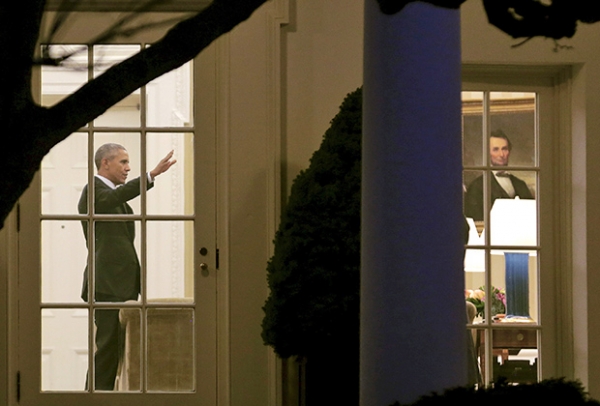
Barack Obama in the oval office of the White house. 28 January 2016
Most of the Republican candidates, with the exception of Donald trump, in favour of more stringent counter Russian “aggression”, including the supply of lethal weapons to Ukraine, the stationing of interceptor missiles and radars in Poland and the Czech Republic, the introduction of a no-fly zone in Syria. According to Marco Rubio (whom many experts consider a puppet of the Republican establishment), “[Putin] needs to understand that the invasion of neighbouring States, support bloody dictators like Assad, the violation of the airspace and threats to other countries are expensive”.
Candidates from the Democratic party also tend to distance themselves from the Obama foreign policy. Despite notable successes, including the lifting of sanctions with Cuba, an agreement on Iran’s nuclear programme and the TRANS-Pacific partnership, continuing problems in the middle East, which Obama promised to solve, cause discontent among the majority of the American electorate. All the more authoritarian model of government gives the candidates the Democrats to appeal to liberal of their supporters on issues such as democratization and the rights of the LGBT community. Like their colleagues-Republicans, Democrats show a hawkish stance is even a “dove”, as Bernie Sanders supports the idea of “anti Putin” and isolation of the Russian leadership.
As a former Secretary of state Hillary Clinton was one of the architects of the “reset”. Now she takes a firm stance to distance himself from the course and to avoid criticism. Protecting the “reset” policy as reasonable, given the results (the new start Treaty, cooperation on Afghanistan and Iraq), Clinton tries to lay the blame for the subsequent deterioration in relations to the growing authoritarianism in Russia and Putin’s need to divert attention from internal problems by aggressive, anti-American foreign policy. According to Clinton, Putin’s goal – “to block, to undermine American power and to oppose her everywhere and always.”
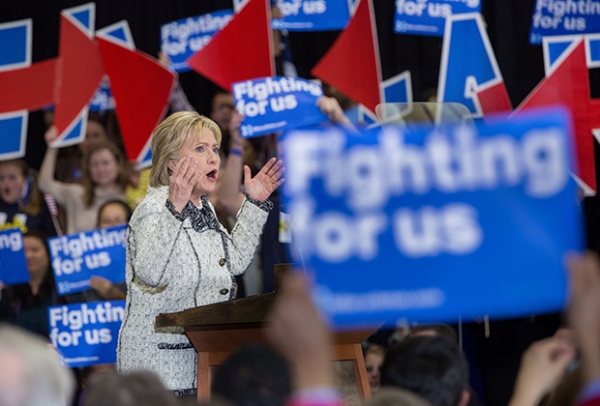
Hillary Clinton and her supporters in the primaries in South Carolina. February 27, 2016
Thus, the political climate in the U.S. is unlikely to contribute to the rapprochement of the two countries or at least to reduce the tension, at least until after the election cycle and a new administration will enter the White house. But political factors will continue to hinder development of cooperation. Russia in Washington very few friends and many enemies. Over the last decade formed an influential anti-Russian lobby. It includes the old organizations of ethnic groups traditionally experiencing hostility to Russia (poles, Balts, Ukrainians) and representatives of post-Soviet States that have sought to distance themselves from Moscow through integration with the West (in particular Georgia and Ukraine), the neo-conservative think-tanks (e.g. Heritage Foundation and American Enterprise Institute), who consider Putin’s Russia a threat to American hegemony, “liberal hawks” and advocates of spreading democracy. According to political scientist Andrei Tsygankov, lobby promotes a distorted view of contemporary Russia, drawing her imperialist revanchist power, views which are contrary to the principles and values of the West.
This lobby is not the only thing that affects the course against Russia. However, adherents of such views were able to form a common discourse so that it does not promote compromise or understanding the motives and interests of Moscow. Russia are unable to have their own lobbyists in the us capital, are Israel, Japan and even Poland, that’s why no one promotes its interests and bring its point of view to the Washington establishment. “Image problem” of Russia cannot be solved only by attracting the most influential lobbyists and the most effective PR strategies. The real problem is much deeper: post-Soviet Russia does not possess the attractiveness and “soft power” capable of defeating stereotypes about the authoritarian and backward Russian society.
The American establishment is largely United in the opinion about the threat from Russia, however there are different points of view on how to react to it. Hawks from both parties have advocated a more resolute response to “aggression”. So far Obama has resisted calls to escalate American involvement in the conflicts in Ukraine and Syria, but even inside the administration, disagreements. Evelyn Farkas, senior specialist of the Pentagon to Russia and Ukraine, resigned because of the unwillingness of the President to proceed to a direct confrontation with Moscow. Later in a column in Politico magazine she said, “Challenge from Russia to the international system, democracy and market capitalism are so fundamental that we simply cannot allow the Kremlin to succeed in Syria or elsewhere”. Therefore, future administration will be under strong domestic political pressure from both parties — to pursue a more assertive policy toward Moscow.
Differences in worldview
Ideological differences also contribute to easing tensions. So Russia got what it wants, the U.S. would have to recognize the legitimacy of her desire to preserve his interests in the post-Soviet space. For the most part of the American establishment talk of a “sphere of influence” contrary to the law of Nations and of States to choose its own foreign policy and are a reflection of the anachronistic understanding of international relations in the spirit of the Realpolitik of the nineteenth century. Of course, the well-known American realists — Henry Kissinger, John Mirshaymer, Stephen Walt urged the United States to respect Russia’s right to spheres of influence in the neighbouring region. But they are in the minority, and their opinion is harsh criticism or ignored.
The us elite and the society was never able to perceive the approaches of international politics from the standpoint of Realpolitik and balance of power. From the first days of the “founding fathers” was quite suspicious of the European policies based on these postulates, considered it immoral and undemocratic. Being away from the rivalry and conflict that raged in Europe, the United States became a world power, almost not suffered from invasions and destructive wars. It was not necessary to apply realistica model, so ingrained a more idealistic approach to international relations. As noted Mirshaymer, “realism is contrary to the views of Americans about themselves and the world in General. In particular, realism is not consistent with deeply rooted in American society with optimism and moralism”.
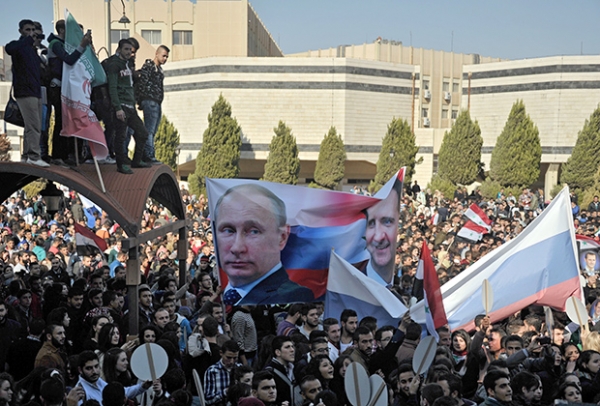
A meeting of students of the University of Baath in HOMS in support of the operations of the aerospace forces of the Russian Federation in Syria
Photo: Dmitry Vinogradov / RIA Novosti
Of course, liberal idealism is just one of the trends in American foreign policy, which had to struggle with isolationist and Imperial currents (that is, the doctrine of predestination) and even survive the rise of realism (especially in the period of the foreign policy of the Nixon — Kissinger). But after the cold war in foreign policy reigned Supreme liberal idealism. The victory of America in this confrontation and subsequent domination in the international system has consolidated an idealistic approach and has led to opinionated ideas about American exceptionalism that ignore the numerous cases in which US shamelessly used Realpolitik. The American elite believes that the United States is leading a unique international order based on universal liberal principles and serving the interests of all mankind. The recognition of the right of Russia on “sphere of influence” would jeopardize not only American hegemony, but the future is fundamentally just world order.
The belief in liberal internationalism is often associated with the absolutization of the liberal democracy as the most effective and fair form of government. Democratic system not only in the interest of the population of any country, but also contributes to international peace and stability, as democracies do not fight each other, while autocracies are prone to aggression and bellicosity. Attempts to improve relations with Moscow, many in Washington perceive it as a futile effort to appease, which will trigger a new aggression of the authoritarian regime of Putin, needing bellicose and nationalist foreign policy, to compensate for the lack of legitimacy inside the country and failures abroad.
* * *
What are the conclusions? If we consider structural factors, the U.S. does not want to establish a relationship or to enter into a direct confrontation with the dying, in their opinion, the power, preferring to defer the issue for a future in which Russia’s capabilities will be reduced. This means ignoring calls by the Kremlin to create a new security architecture in Europe. At the same time taking steps to strengthen NATO and its defence capabilities in the Baltic States, Poland and Eastern Europe to deter Moscow from adventurous behavior that would be designed to force Washington to start negotiations on these issues. The U.S., however, is unlikely to take action (including the provision of Ukraine lethal weapons or the imposition of a no-fly zone in Syria), which provoke direct confrontation with Moscow. The optimal strategy of States in Ukraine and in Syria is to use the crisis to accelerate the weakening of Russia, causing her to get caught up in the conflict.
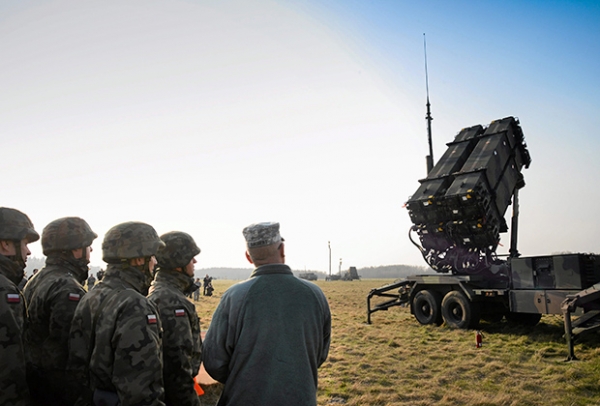
Polish and American soldiers during the maneuvers with participation of system “patriot” near Warsaw. March 21, 2015
Photo: Franciszek Mazur / Agencja Gazeta / Reuters
Political and ideological factors have seriously impeded the achievement of a comprehensive agreement the United States with Russia, at least until Moscow the current government. Naxalnosti given the political atmosphere, the slightest hint of the validity of Russia’s actions in Ukraine and Syria is likely to provoke a condemnation as an attempt of appeasement. Even the current strategy of the Obama administration is to stall for time and allow Russia “to Deplete their resources” seems the most reasonable from the point of view of structural factors (as noted above), criticized Republican opposition and “liberal hawks”. So far Obama has managed to retreat from its position, and the next President will probably be to adhere to the same restraint, after subsides the intensity of pre-election rhetoric and will have to make concrete decisions. However, influential anti-Russian lobby will continue to put pressure on the future President, demanding an adequate response to “the Russian threat”. In addition, a significant portion of the American elite today believes that Russia will stop to question the US dominance and begin to integrate into the Western liberal order only in case of democratic regime change. The elite will not stop the pressure on the administration, insisting on criticism of Moscow for violations of human rights and democracy, and support a line of constructive cooperation or joint action, if it would strengthen or legitimize the Russian leadership.
For US the stakes in Ukraine and in Syria has increased because of great-power calls of Russia. The Kremlin does not demonstrate readiness to make concessions in matters of prestige and status, while Putin can stay in power until 2024 (or even longer), so the fate of relations between the two countries is linked to the struggle for the future of international order. The situation begins to resemble the cold war: America goes to the containment policy in preparation for a long-term confrontation. In this case, the question will stand as follows: who will last longer and will demonstrate the resolve to force the other side to back down? And if that happens, history may indeed repeat itself, and the most severe impacts will be felt by the people of Ukraine and Syria.








